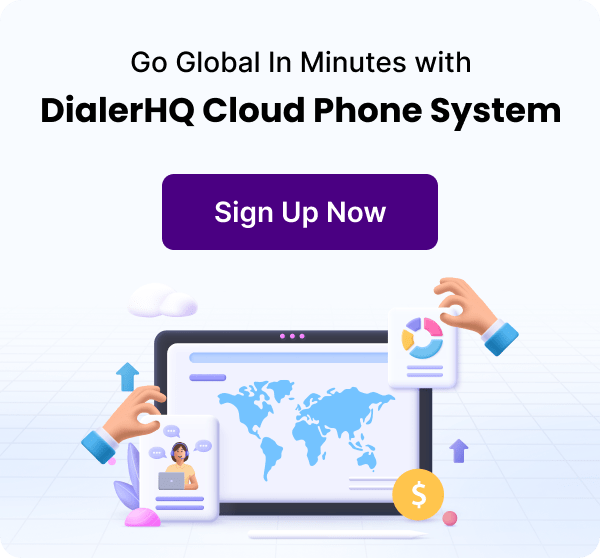Senior Writer: Supriya Bajaj
Business Process Outsourcing (BPO) and call centers are integral parts of modern business operations, playing crucial roles in enhancing efficiency, reducing costs, and improving customer satisfaction. Moreover, 96% of customers say that excellent customer service builds trust. While both are focused on providing specialized services, they differ in their scope and approach.
Understanding what is the difference between BPO and call centers is essential for businesses seeking to optimize their operations and customer service strategies.
What is BPO (Business Process Outsourcing)?
Business Process Outsourcing, or BPO, is a strategic practice in which a company contracts with a third-party service provider to perform specific business tasks or processes.

These tasks can include customer service, technical support, accounting, human resources, and other operational functions. BPO is often used by companies to streamline operations, reduce costs, and focus on core business activities.
What is a Call Center?
A call center is a centralized office or facility that is equipped to handle a large volume of telephone calls for an organization. Call centers are commonly used for customer service, telemarketing, sales support, and other inbound and outbound communication tasks. Call center agents are trained to handle customer inquiries, resolve issues, and provide information about products or services.
When deciding between BPO and a call center for your business, consider your specific needs and goals. If you require expertise in non-core business processes, such as accounting or HR, BPO may be the better choice. On the other hand, if you're focused on improving customer interactions and service, a call center may be more suitable.
BPO vs. Call Centers: The Main Difference
While call centers are a common component of BPO services, there is a distinct difference between the two. BPO encompasses a broader range of business processes beyond just handling phone calls. BPO providers can offer a variety of services, such as data entry, payroll processing, IT support, and more.
| Aspect | Call Center | BPO (Business Process Outsourcing) |
|---|---|---|
| Scope of Services | Primarily handles telephone communications | Can encompass a wide range of business processes beyond calls |
| Function | Focuses on managing inbound and outbound calls | Manages various business tasks like customer service, IT support |
| Typical Services | Customer support, telemarketing, sales support | Data entry, payroll processing, human resources, accounting |
| Communication Channels | Mainly telephone-based | Can include phone, email, chat, social media, and more |
| Specialization | Specializes in handling high call volumes efficiently | Specializes in streamlining and improving various processes |
| Cost | Generally lower cost per call due to specialization | Cost can vary based on the complexity and scale of services |
| Scale | Can handle large volumes of calls | Can scale to manage diverse business processes for clients |
| Customer Interaction | Direct interaction with customers | Can involve direct or indirect interaction, depending on task |
| Technology | Relies heavily on phone systems and CRM software | Uses a variety of technology tools tailored to specific tasks |
| Examples | Customer service hotlines, technical support centers | Outsourced HR departments, finance and accounting services |
Call centers, on the other hand, focus specifically on managing telephone communications. While they may also provide customer support and other services, their primary function is to handle incoming and outgoing calls efficiently.
In summary, BPO is a comprehensive strategy that involves outsourcing various business processes to third-party providers. At the same time, a call center is a specific type of service that falls under the umbrella of BPO, focusing on managing telephone communications.
What are the Types of Business Process Outsourcing (BPO)?
To better understand the concept of BPO, you can check out the different types of business process outsourcing –
1. Back Office Outsourcing: This type of BPO involves outsourcing non-customer-facing business processes such as data entry, data management, payroll processing, accounting, and human resources.
2. Offshore Outsourcing: Offshore outsourcing involves outsourcing business processes to a third-party service provider in a different country. This type of outsourcing is often chosen for its cost-effectiveness, as labor costs may be lower in the offshore location.

3. Front Office Outsourcing: Front office outsourcing involves customer-facing processes such as customer service, technical support, sales, and marketing. This type of outsourcing is often used to improve customer experience and reduce costs.
4. Nearshore Outsourcing: Nearshore outsourcing is similar to offshore outsourcing, but the third-party service provider is located in a nearby country or region. This type of outsourcing is chosen for its geographical proximity, which can make communication and collaboration easier.
5. Knowledge Process Outsourcing (KPO): KPO involves outsourcing high-level, knowledge-based processes that require specialized expertise. These processes can include research and development, legal services, and financial analysis.
6. Onshore Outsourcing: Onshore outsourcing involves outsourcing business processes to a third-party service provider in the same country. This type of outsourcing is often chosen for its cultural alignment, regulatory compliance, and ease of communication.

What are the Types of Types of Call Centers?
Just like BPO, call centers also have different types. Let’s explore them –
1. Inbound Call Centers: Inbound call centers handle incoming calls from customers, such as inquiries, complaints, and product support. They are focused on providing excellent customer service and resolving issues efficiently.
2. Outbound Call Centers: Outbound call centers make outgoing calls to customers for purposes such as sales, telemarketing, market research, and follow-up calls. They are focused on generating leads, sales, and gathering information.
You May Also Read : Inbound Vs. Outbound Call Center: What is the Difference?
3. Blended Call Centers: Blended call centers handle both inbound and outbound calls. They are designed to maximize efficiency by utilizing agents for both types of calls based on demand.
4. Virtual Call Centers: Virtual call centers operate remotely, with agents working from different locations. They use cloud-based technology to handle calls, enabling flexibility and scalability.
5. Offshore Call Centers: Offshore call centers are located in a different country from the company they are serving. They are often chosen for their cost-effectiveness and ability to handle large call volumes.
6. Onshore Call Centers: Onshore call centers are located in the same country as the company they are serving. They are chosen for their cultural alignment, language proficiency, and regulatory compliance.
Characteristics of BPO and Call Centers
BPO providers specialize in specific business processes, offering expertise and efficiency in those areas, while call centers focus on direct customer interaction, handling inquiries, support issues, and sales calls.
Characteristics of BPO (Business Process Outsourcing)

- Specialization: BPO providers specialize in specific business processes, offering expertise and efficiency in those areas.
- Cost-Effectiveness: Outsourcing non-core functions to BPO providers can result in cost savings, as they often operate in regions with lower labor costs.
- Scalability: BPO services can be scaled up or down based on business needs, allowing for flexibility in operations.
- Global Reach: BPO providers can operate globally, offering services to businesses in different countries and time zones.
- Technology: BPO providers use advanced technology and tools to streamline processes and improve efficiency.
- Compliance: BPO providers ensure compliance with relevant regulations and standards in the industries they serve.
Characteristics of Call Centers

- Customer Interaction: Call centers focus on direct customer interaction, handling inquiries, support issues, and sales calls.
- Communication Channels: Call centers utilize various communication channels such as phone, email, chat, and social media to engage with customers.
- Service Levels: Call centers are often measured based on key performance indicators (KPIs) such as response time, resolution time, and customer satisfaction.
- 24/7 Availability: Many call centers offer round-the-clock service to cater to customers in different time zones.
- Training: Call center agents undergo extensive training to ensure they can effectively handle customer inquiries and resolve issues.
- Technology: Call centers use advanced call center software and CRM systems to manage customer interactions efficiently.
What Should I Choose for My Business: BPO or a Call Center?
The choice between BPO and a call center depends on your business needs and priorities.
- If you require assistance with specific non-core business processes such as accounting, HR, or IT support, BPO may be the better option as it offers expertise and efficiency in those areas.
- If you need to enhance your customer service and engagement efforts, a call center may be more suitable, as it specializes in direct customer interaction and offers a range of communication channels to engage with customers.
It’s also worth considering a combination of both BPO and call center services to address different aspects of your business operations. Assess your requirements, budget, and long-term goals to determine the most suitable solution for your business.
Final Thoughts
In conclusion, both BPOs and call centers play crucial roles in modern business operations, offering specialized services to enhance efficiency and customer satisfaction. The choice between the two depends on the specific needs and priorities of a business, with many companies opting for a combination of both to optimize their operations and customer service efforts.
Frequently Asked Questions
While call centers are a common component of BPO services, BPO encompasses a broader range of business processes beyond just handling phone calls.
No, BPO and call centers are not the same. BPO is a comprehensive strategy that involves outsourcing various business processes to third-party providers, while a call center is a specific type of service that falls under the umbrella of BPO, focusing on managing telephone communications.
Both call centers and BPO providers focus on improving operational efficiency and customer service. They also often utilize similar technologies and tools, such as CRM software, to manage processes effectively.
Supriya is a highly skilled content writer with over 8 years of experience in the SaaS domain. She believes in curating engaging, informative, and SEO-friendly content to simplify highly technical concepts. With an expansive portfolio of long-format blogs, newsletters, whitepapers, and case studies, Supriya is dedicated to staying in touch with emerging SaaS trends to produce relevant and reliable content.
Updated : March 28, 2024

Subscribe to our newsletter & never miss our latest news and promotions.





